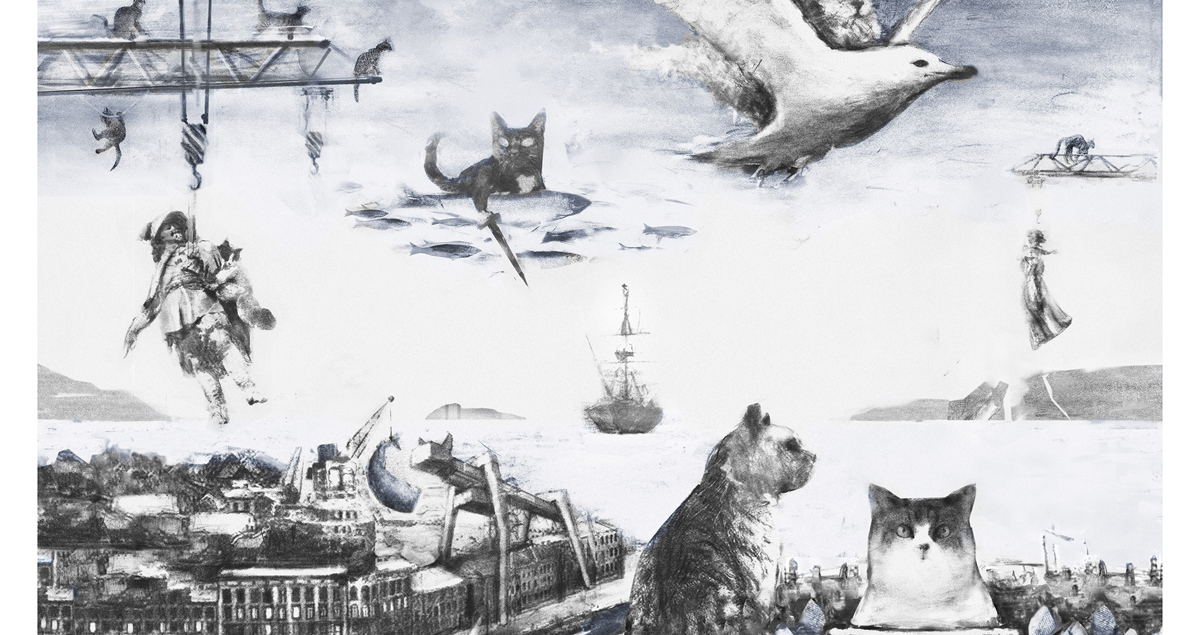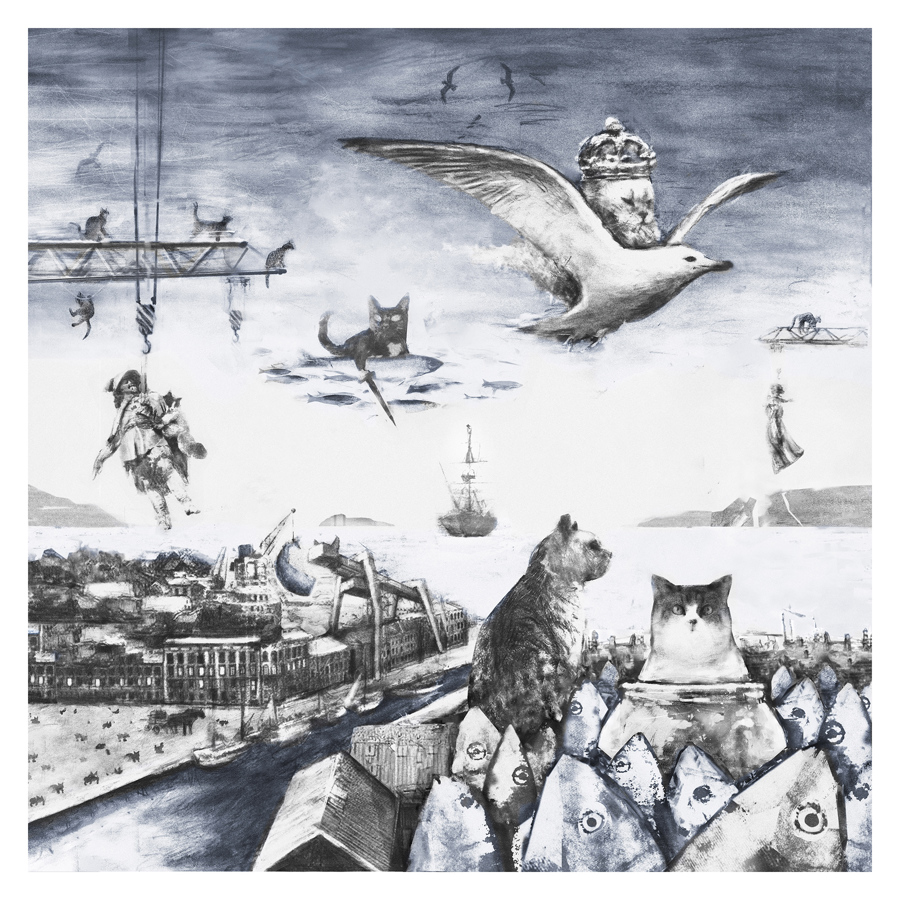
Göteborg
« Ici s’élèvera la ville ! » proclama Sa Majesté. Ses sujets s’entre-regardèrent, médusés. Que voulait-il dire ? Construire une ville sur cette mince bande de terre d’à peine vingt kilomètres où le royaume de Suède se jette dans la mer du Nord ? La difficulté résidait moins dans le choix d’un emplacement pour le nouveau port que dans son éventuelle pérennité. Leur voisin, le royaume du Danemark, voyait d’un mauvais œil les ports suédois et les Suédois en général.
Mais, à n’en pas douter, l’endroit, à l’embouchure du fleuve Göta, avait ses avantages. Le sol était fâcheusement marécageux, mais un affleurement rocheux permettrait au village de s’accrocher à la falaise.
C’est donc là que s’éleva la ville, une forteresse (borg en suédois) sur les rives du fleuve Göta. Göte-borg. Quel autre nom aurait-elle pu recevoir ?
Et pourtant, dès les premiers instants de sa fondation, en 1621, elle en porta également un autre : Gothenburg. Par leur fonction en tant que plaque tournante du commerce et des échanges internationaux, les villes comme celle-ci ont toujours attiré leur lot de visiteurs étrangers : en l’occurrence, Hollandais et Allemands, un peu d’Écossais et, plus tard, beaucoup d’Anglais. Tous voulaient leur part du gâteau, ils s’établirent donc directement à l’intérieur des fortifications de la nouvelle ville. Et même si leur bouche se refusait à former correctement les sons émis par les cordes vocales suédoises lorsqu’elles prononçaient Jöteborj ([yœte borj]), ça ne les empêchait pas d’avoir leur petite idée de l’origine du mot : Goths (selon les Anglais), Goten (selon les Allemands), Goter (selon les Suédois).
De là naquirent les problèmes entourant le nom de Göteborg. Pourquoi certains habitants de la Suède se font appeler des Geats (göter en suédois) et pourquoi existe-t-il plusieurs variantes du même nom à l’intérieur d’un espace géographique restreint ? Les Gutes ou Gotlanders (gutar en suédois), les Jutes (jutar en suédois) dans le Jutland danois ? Alors qu’aucune preuve historique ou archéologique n’a jamais permis de les lier aux Goths (goter en suédois).
Si ce sont les Geats qui sont à l’origine du nom, il s’agissait peut-être là d’une menace voilée : « N’approchez pas ou Rome brûlera ! » Mais le nom et ses différentes formes circulent peut-être depuis que les peuples de barbares germaniques ont foulé le sol européen. Dans ce cas, les Goths et les Geats partagent une généalogie dans les verbes suédois gjuta et utgjuta, respectivement « déverser » ou « éjecter ». Il se trouve des experts en toponymie pour affirmer que les Geats auraient éjecté leur sperme (4 millilitres), et d’autres pour défendre l’idée d’un lien avec les rapides et les chutes qui se déversent en amont du fleuve Göta (565 mètres cubes à la seconde).
Une fois les marchands et les soldats bien installés parmi les roseaux sur les berges du fleuve, les Suédois eurent la bonne fortune de conquérir plusieurs provinces, arrachées aux mains des Danois et des Norvégiens. Soudain, la Suède possédait 400 kilomètres de côte à l’ouest, au lieu de 20. Sans parler d’un nouvel accès à la mer au sud – ce qui était inédit.
Cela signifiait que la ville de Göteborg aurait pu être relocalisée n’importe où, mais elle ne bougea pas de là.
Lentement, mais sûrement, les gens commencèrent à affluer. Les paysans des provinces avoisinantes s’installèrent à demeure, les sabots pleins de foin, et créèrent le magnifique dialecte de Göteborg, le jöteboschkan ([yoeteboshkan]), que tout le monde adore. Ils écrivirent des chansons, jouèrent au soccer, assemblèrent des automobiles et construisirent des chantiers navals appartenant aujourd’hui à l’histoire. Göteborg a eu droit à bien des surnoms au fil du temps, incluant la petite Londres ou la Marseille du Nord ; en argot elle se fait appeler Jötet ([yœtet]) ou Jöttlaborg ([yœtlaborj]), mais pas par les gens d’ici. Seulement par celles et ceux qui, encore aujourd’hui, aimeraient se blottir dans les tiges de souchet le long du fleuve Göta.
Erik Andersson
Goths, Goten, goter : Peuples germaniques à l’origine indéterminée qui envahirent de grands territoires de l’Empire Romain.
Jutes, Jüten, jutar : Peuples originaires de la péninsule du Jutland danois.
Gutes, Goten, gutar : Peuples originaires de l’île de Gotland, en mer Baltique.
Geats, Gauten, göter : Peuples originaires des landes du sud de la Suède.

Här skall staden ligga, sade konungen. Alla tittade osäkert på varandra. Vad menade han? Det fanns ju bara en remsa om 20 km där det svenska riket mötte västerhavet. Problemet var inte var den nya hamnstaden skulle ligga, utan hur man skulle få den att bestå. Det danska grannriket hade en mycket låg uppfattning om svenska hamnstäder, och om svenskar över huvud taget.
Men läget var bra, invid Göta älvs mynning. Tyvärr var det mest träskmark, men man hittade en bergknalle som staden kunde klamra sig fast vid.
Så där växte staden upp, en befästning (borg) vid Göta älv. Den kunde knappast få heta något annat än Göteborg.
Men redan från början, vid stadens grundläggning 1621, fanns det ytterligare ett namn: Gothenburg. Det ligger i sakens natur att handelsplatser är internationella miljöer, och det kom också många holländare och tyskar, en del skottar och sedermera gott om engelsmän. De ville ha sin del av handeln och parkerade sig rentav i styret för den nya staden. För dem var det omöjligt att få fram de ljud som kom ur svenskarnas strupar när de sade Jöteborj, men de tycks ha haft en klar uppfattning om vad namnet syftade på: Goths, Goten, goter.
Och det är där det blir svårt med namnet Göteborg. Varför finns det folk i Sverige som kallas för göter, varför finns det andra varianter i närheten: gutar på Gotland, jutar på Jylland? Det har inte gått att hitta historiska eller arkeologiska bevis på en förbindelse med goterna.
Om göterna själva kom på sitt namn så kan det ha varit ett sätt att säga mucka inte med oss för då bränner vi ner Rom. Eller så kan namnet i dess olika former ha funnits med ända sedan de germanska rövarbanden drog in över Europa. I så fall har göter och goter ett gemensamt ursprung, det vill säga verbet ”gjuta”, ”utgjuta”. En del ortnamnsforskare vill ha det till att göterna utgöt sädesvätska (4 milliliter), medan andra pekar på forsarna och fallen i Göta älvs övre lopp (565 kubikmeter per sekund).
När väl köpmännen och soldaterna hade boat in sig i vassarna kring älven råkade svenskarna erövra landskapen Bohuslän, Halland, Skåne och Blekinge från danskarna och norrmännen. Nu hade Sverige över 400 kilometer västkust istället för 20, och dessutom en sydkust som man inte alls hade haft tidigare.
Man kunde faktiskt lägga Göteborg ungefär var som helst, men det fick ligga kvar där det låg.
Sakta och tvekande började folk söka sig dit. Folk från Bohuslän, Halland och Västergötland kom med halm i skorna och skapade den vackra göteborgsdialekten, jöteboschkan, som är älskad av alla. Visor skrevs, fotboll sparkades och bilar monterades, men varven lades ner. Göteborg har kallats Lilla London och Nordens Marseille; smeknamn som Jötet och Jöttlaborg används inte av göteborgarna själva, utan av alla dem som vill krypa upp i knät på staden vid Göta älv.
Erik Andersson
Goths, Goten, goter folkstam med oklar hemvist; intog delar av Romarriket
Jutes, Jüten, jutar folk från den danska halvön Jylland
Gutes, Goten, gutar folk från ön Gotland i Östersjön
Geats, Gauten, göter folk från delar av södra Sverige
“Let the town be here!” proclaimed His Majesty. People looked at each other in bewilderment. What did he mean? Build a town on that thin twenty-kilometre strip of coast where the kingdom of Sweden hit the North Sea? The problem was less where to locate the new harbor town as how to make it endure. The neighbouring kingdom of Denmark took a dim view of Swedish ports and of the Swedes in general.
But the location, at the mouth of the Göta River, was undeniably a good one. Though the ground was rather marshy, there was a rocky outcropping to which the settlement could cling.
So the town was built up around a fortress (Sw: borg) along the Göta River. What more suitable name than Göte-borg?
Yet from the town’s earliest moments after being founded in 1621, it also had a second name: Gothenburg. Due to its function as a hub for international trade, the city attracted large numbers of Dutch and Germans, some Scots and, later, plenty of English. They all wanted a piece of the action and set up shop inside the fledgling city’s fortifications. Although they found it impossible to replicate the sounds uttered by Swedish vocal cords when pronouncing Jöteborj, |[yœte borj] that didn’t prevent them from having their own ideas about where the name came from: Goths (English), Goten (German), goter (Swedish).
This gave rise to difficulties surrounding the name Göteborg. Why are some people in Sweden referred to as the Geats (Sw: göter), and why are there several variants of the same name within a small geographical area—the Gutes, or Gotlanders (Sw: gutar) and the Jutes (Sw: jutar ) in Danish Jutland— while no historical or archeological evidence has ever linked them to the Goths (Sw: goter)?
If the Geats came up with the name themselves, it may have been a covert threat: “Don’t mess with us or Rome will burn.” But the name and its different forms may have been circulating since the time when Germanic barbarians roamed Europe. In which case the Goths and the Geats share their origin in the Swedish verbs gjuta and utgjuta, meaning “to pour” or “to discharge.” Some toponymists claim that the Geats
discharged their semen (4 millilitres), while others point to a connection with the rapids and waterfalls upstream from the Göta River (565 cubic metres per second).
Once the merchants and soldiers had settled among the reeds along the river, the Swedes had the good fortune of conquering several provinces from the Danes and Norwegians. Suddenly, Sweden had more than 400 kilometres of western coastline instead of just twenty, in addition to access to the sea from the south.
This meant they could have re-located Göteborg just about anywhere, but they left it where it was.
Slowly but surely, people began to flock to the city. Country folk from the nearby provinces arrived with shoes full of hay and established the magnificent Göteborg dialect, jöteboschkan [yoeteboshkan], beloved by all. They wrote songs, played soccer, assembled automobiles and set up shipyards that remain a part of their history. Göteborg has had many nicknames over the years, including “Little London” and “the Marseille of the North”. In slang, it is referred to as Jötet [yœtet] and Jöttlaborg [yœtlaborj], but not by the locals—only by those who, still today, would like to huddle in the bulrushes along the Göta River.
Erik Andersson
Goths, Goten, goter Germanic tribe of undetermined origin that invaded parts of the Roman Empire.
Jutes, Jüten, jutar people from the Danish Jutland peninsula.
Gutes, Goten, gutar people from the island of Gotland in the Baltic Sea. Geats, Gauten, göter people from parts of southern Sweden.
